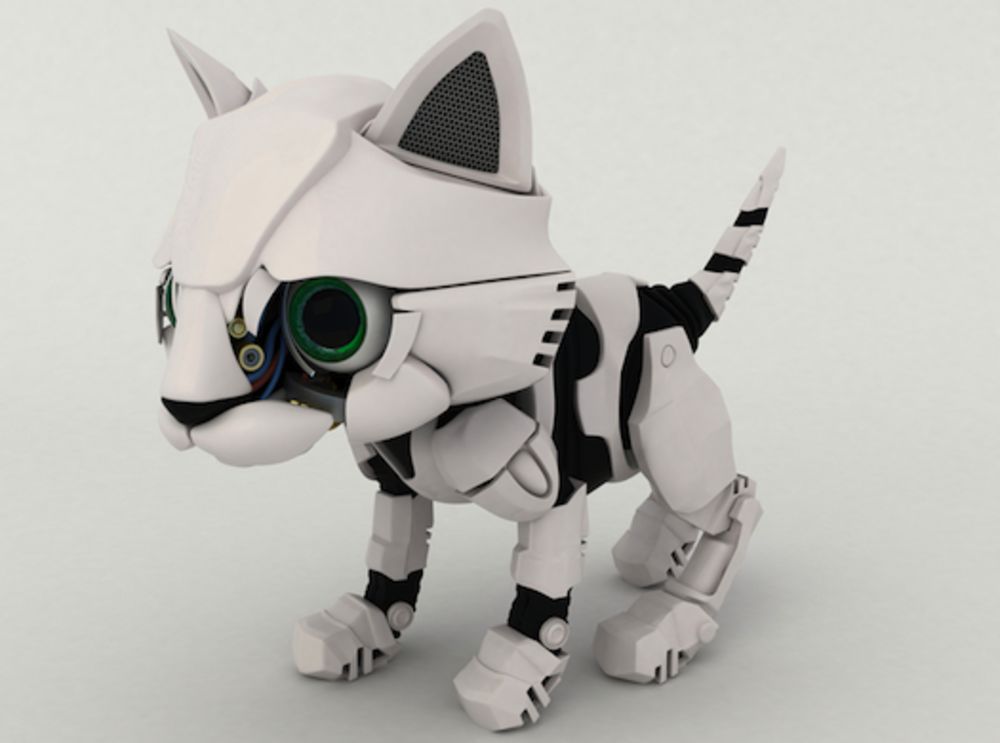Imagine a cat that can keep a person company, doesn’t need a litter box and can remind an aging relative to take her medicine or help find her eyeglasses.
copyright by www.omaha.com
 That’s the vision of toymaker Hasbro and scientists at Brown University, who have received a three-year, $1 million grant from the National Science Foundation to find ways to add artificial intelligence to Hasbro’s “Joy for All” robotic cat .
That’s the vision of toymaker Hasbro and scientists at Brown University, who have received a three-year, $1 million grant from the National Science Foundation to find ways to add artificial intelligence to Hasbro’s “Joy for All” robotic cat .
The cat, which has been on the market for two years, is aimed at seniors and meant to act as a “companion.” It purrs and meows, and even appears to lick its paw and roll over to ask for a belly rub. The Brown-Hasbro project is aimed at developing additional capabilities for the cats to help older adults with simple tasks.
No household help, but a company keeper
Researchers at Brown’s Humanity-Centered Robotics Initiative are working to determine which tasks make the most sense, and which can help older adults stay in their own homes longer, such as finding lost objects, or reminding the owner to call someone or go to a doctor’s appointment. “It’s not going to iron and wash dishes,” said Bertram Malle, a professor of cognitive, linguistic and psychological sciences at Brown. “Nobody expects them to have a conversation. Nobody expects them to move around and fetch a newspaper. They’re really good at providing comfort.”
Malle said they don’t want to make overblown promises of what the cat can do, something he and his fellow researcher — computer science professor Michael Littman — said they’ve seen in other robots on the market. They hope to make a cat that would perform a small set of tasks very well. They also want to keep it affordable, just a few hundred dollars. The current version costs $100.
An ongoing project
They’ve given the project a name that gets at that idea: Affordable Robotic Intelligence for Elderly Support, or ARIES. The team includes researchers from Brown’s medical school, area hospitals and a designer at the University of Cincinnati. It’s an idea that has appeal to Jeanne Elliott, whose 93-year-old mother, Mary Derr, lives with her in South Kingstown. Derr has mild dementia and the Joy for All cat Elliott purchased this year has become a true companion for Derr, keeping her company and soothing her while Elliott is at work. Derr treats it like a real cat, even though she knows it has batteries. […]
read more – copyright by www.omaha.com


Imagine a cat that can keep a person company, doesn’t need a litter box and can remind an aging relative to take her medicine or help find her eyeglasses.
copyright by www.omaha.com
The cat, which has been on the market for two years, is aimed at seniors and meant to act as a “companion.” It purrs and meows, and even appears to lick its paw and roll over to ask for a belly rub. The Brown-Hasbro project is aimed at developing additional capabilities for the cats to help older adults with simple tasks.
No household help, but a company keeper
Researchers at Brown’s Humanity-Centered Robotics Initiative are working to determine which tasks make the most sense, and which can help older adults stay in their own homes longer, such as finding lost objects, or reminding the owner to call someone or go to a doctor’s appointment. “It’s not going to iron and wash dishes,” said Bertram Malle, a professor of cognitive, linguistic and psychological sciences at Brown. “Nobody expects them to have a conversation. Nobody expects them to move around and fetch a newspaper. They’re really good at providing comfort.”
Malle said they don’t want to make overblown promises of what the cat can do, something he and his fellow researcher — computer science professor Michael Littman — said they’ve seen in other robots on the market. They hope to make a cat that would perform a small set of tasks very well. They also want to keep it affordable, just a few hundred dollars. The current version costs $100.
An ongoing project
They’ve given the project a name that gets at that idea: Affordable Robotic Intelligence for Elderly Support, or ARIES. The team includes researchers from Brown’s medical school, area hospitals and a designer at the University of Cincinnati. It’s an idea that has appeal to Jeanne Elliott, whose 93-year-old mother, Mary Derr, lives with her in South Kingstown. Derr has mild dementia and the Joy for All cat Elliott purchased this year has become a true companion for Derr, keeping her company and soothing her while Elliott is at work. Derr treats it like a real cat, even though she knows it has batteries. […]
read more – copyright by www.omaha.com
Share this: